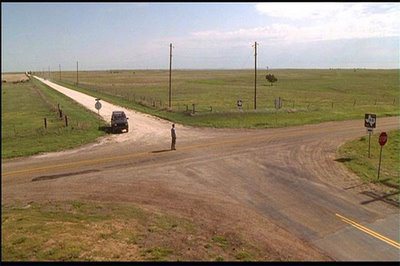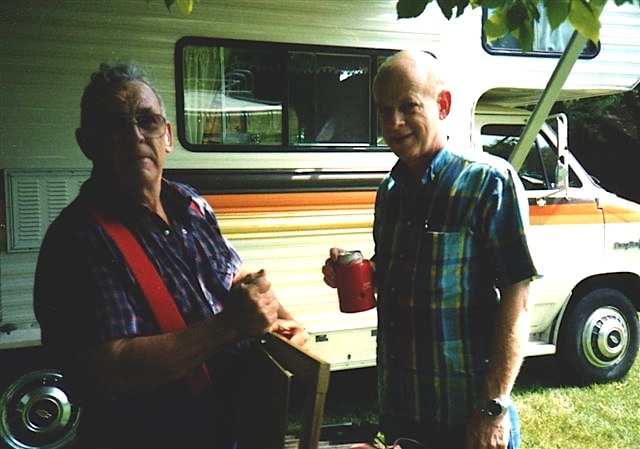“Not surprisingly, my parents’ generation did everything they could to make life easier for their own children. Was that good for us? I wonder. It certainly didn’t do us any good from a cultural point of view. I’m struck by how few boomers have embraced adult culture in middle age. My impression is that they’d much rather watch sitcoms than read novels, go to the opera or listen to jazz. In large part they’re a cohort of Peter Pans, determined not to grow up any more than they can help…”
Archives for January 6, 2014
TT: Most likely you go your way and I’ll go mine
 I read the other day that two old friends of mine got a divorce. I call them “friends” because there was a time when I knew them both quite well, but they moved away from New York a quarter-century ago, and I’ve seen next to nothing of them since then. In fact, I can’t remember the last time that I saw either one in the flesh. So while it briefly made me sad to learn of their decision to part, I realized almost in the next instant that my sorrow was entirely retrospective, and thus meaningless.
I read the other day that two old friends of mine got a divorce. I call them “friends” because there was a time when I knew them both quite well, but they moved away from New York a quarter-century ago, and I’ve seen next to nothing of them since then. In fact, I can’t remember the last time that I saw either one in the flesh. So while it briefly made me sad to learn of their decision to part, I realized almost in the next instant that my sorrow was entirely retrospective, and thus meaningless.
I’ve no idea why they broke up, by the way, though he’s a successful man of a certain age, which makes it not altogether unlikely that I could guess some of his reasons without undue difficulty. Hers are another story. But the truth is that I don’t know either of my old friends anymore, which means that they’re no longer my friends. They might as well be strangers. They exist only in memory.
I recently gave an interview in which I was asked to talk about (among other things) Anthony Powell’s A Dance to the Music of Time. In it I made the following observation:
Another part of what’s fascinating about A Dance to the Music of Time is that it resembles life in that people who you like, die. Or are transformed in such a way that you don’t like them anymore. This is something that Patrick O’Brian, a novelist whom I like very much, does not do. It makes him a lesser artist. Until the very end of the series, O’Brian will not kill off characters whom we like. He wants to keep their world intact, and so it becomes harder and harder for his two principal characters, Aubrey and Maturin, to have interesting new experiences. The problem is that we’re so invested in them that we want things to turn out well for them in every book. With Powell, on the other hand, the characters get under our skins because they sometimes go off to war and never come back.
That’s what my friends did, more or less. They went away and never came back, and I missed them for a time. The wife rather more than the husband: I liked her enormously, though it was evident to me that she could easily be what used to be called “a pistol.” That said, I liked him, too, and thought them both thoroughly decent people, and in the ensuing years I’ve wondered on occasion how they were doing. Now, up to a point, I know.
Part of the melancholy of modern American life is rooted in the fact that you can’t help but lose touch with friends. Unless you live, as I once did, in a small town, you have to work very hard to maintain friendships with people whom you don’t see regularly in the normal course of things–at the office, say. Getting married inevitably causes certain friends to drop off the scope. So do having children and getting divorced. To move to another city is almost by definition to trade in your old friends for new ones. I hate to say it, but I can come close to counting on the fingers of one hand the people to whom I’m as close today as I was in 1989, or 1999. The friction of life can turn the best of intentions to dust.
I know, of course, that what makes me feel so wistful is part of the dynamism that is inextricably bound up with the American national character. Those who wish to change their lives can always “light out for the Territory,” as Huck Finn puts it, and see what there is to see further down the road. That’s what I did, in stages: I made my way from Smalltown, U.S.A., to upper Manhattan, and it’s perfectly possible that I haven’t made my last move yet.
 Nor do I regret, save in occasional spasms of self-doubt, my youthful decision to hit the road. Unfortunately, I’m not so sure that it suited, or suits, my inborn temperament, which I suspect was–and is–otherwise inclined. Yet I know that I, too, partake of the American itch to wander. The great unrealized fantasy of my life, one that goes all the way back to my high-school days, has been to buy a motor home, pull up stakes, and light out for nowhere in particular. My father, whom I suspect of having had the same fantasy, got as far as buying the motor home, though he never drove it much more than a hundred miles from our front door. I never saw him sadder than on the day he finally sold it, a year or two before his death.
Nor do I regret, save in occasional spasms of self-doubt, my youthful decision to hit the road. Unfortunately, I’m not so sure that it suited, or suits, my inborn temperament, which I suspect was–and is–otherwise inclined. Yet I know that I, too, partake of the American itch to wander. The great unrealized fantasy of my life, one that goes all the way back to my high-school days, has been to buy a motor home, pull up stakes, and light out for nowhere in particular. My father, whom I suspect of having had the same fantasy, got as far as buying the motor home, though he never drove it much more than a hundred miles from our front door. I never saw him sadder than on the day he finally sold it, a year or two before his death.
I’m lucky in that I remain close to my family–I know people who haven’t spoken to their siblings for years–and that I’ve had the same best friend, Our Girl in Chicago, for nearly two decades. It’s even more remarkable that she’s lived halfway across the country from me for the whole of that time. And I’m luckier still to have made a happy marriage in the middle of life. Alas, I’m also old enough that the ranks of my other friends are starting to be thinned out by death, the most permanent of partings.
So now I make a concerted effort to seek out new friends, most of whom are younger than me, and I try as best I can to maintain such long-lived friendships as I still have. Like most members in good standing of the verbal class, I use Facebook and Twitter to the latter end, even though I’m well aware that they supply nothing more than a simulacrum of true friendship. But long experience has taught me that most friendships, no matter how true and enduring they may seem at first blush, will prove in the end to have been strictly temporary. And once in a while I hear a piece of news about a person whom I used to know once upon a time, and my heart lifts or sinks for a moment, depending on whether the news is good or bad–and assuming that I can still tell the difference.
* * *
Bob Dylan sings “Most Likely You Go Your Way (And I’ll Go Mine)”:
TT: Just because
Marlon Brando in an excerpt from Joseph Mankiewicz’s 1953 film version of Julius Caesar:
(This is the latest in a series of arts-related videos that appear in this space each Monday and Wednesday.)
TT: Almanac
“What a relief it is to listen to American accents dealing with Shakespeare. They sound much more authentic than our own overrefined or suburban efforts.”
Alec Guinness, A Positively Final Appearance
